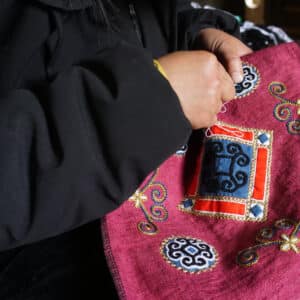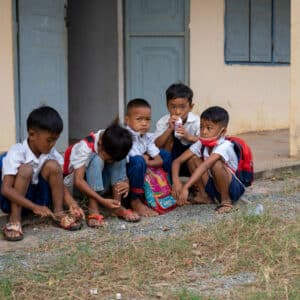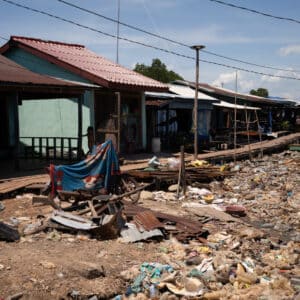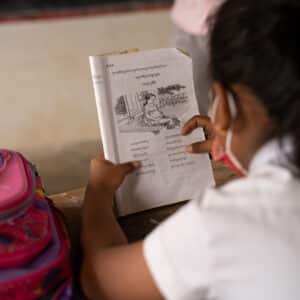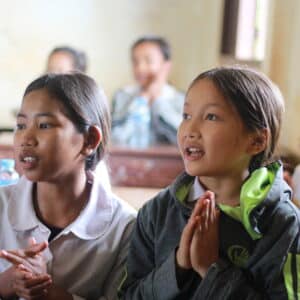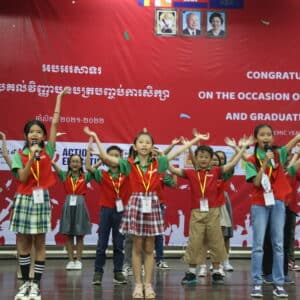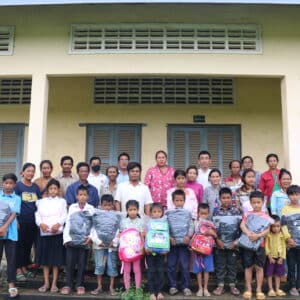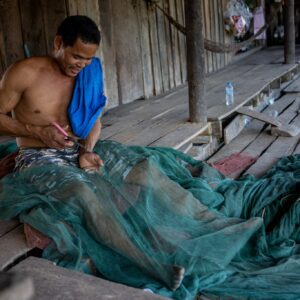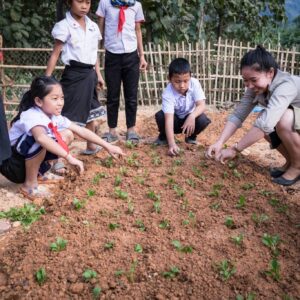In August 2020, Aide et Action delivered radios to remote villages along the Mekong in Cambodia’s Kratié province to ensure children could tune into a new form of learning in the midst of the current pandemic.
A bumpy couple of hours from Kratié town along windy dirt roads led the Aide et Action program and communication teams to the remote fishing village of Pun Thachea. Along the way, we needed to disembark the car several times as it struggled to cross some small bridges and navigate muddy craters carved out by recent heavy rains.
A local employee of the Provincial Department of Education pointed out other villages along our route that receive emergency support from international NGOs when the floods wreak havoc. “It’s dangerous living so close to the river”, he attested. But, the river also provides for many of the communities living here along this remote stretch of the Mekong river in northern Cambodia.

Today’s emergency, however, is Covid-19 and the impact it has had on access to education. After six months of school closures, we were on our way to Pun Thachea primary school to deliver radios, school supplies, and hygiene materials to students as they geared up to return to formal education. Here, there’s been a fear that the villages’ children who are from the Phnong ethnic minority group have not been able to keep up with distance learning programmes and may face challenges as they now re-enter school.
The literate generation
When we arrived, local farmer and fisherwoman Andout Theary was pleased to bring her children along to greet us and accept the learning materials that they were sorely missing. Theary calls her children “the literate generation” – the first literate generation of the village – and is eager to see them return to school.
In 2012, Pun Thachea village received its first school. “When I was a child, we studied under a mango tree because we had no school building”, remembered Theary. “But I only studied until Grade 1 – my teacher died and my education stopped”, she added, explaining why she and her husband are illiterate and not able to teach their kids at home.

Theary’s eldest two children have now studied as far as Grade 6 but after that she was unable to support them any further as the secondary school was out of reach – geographically and financially. Her youngest two children are now in Grade 3 and 5 respectively, but due to Covid-19, have been out of school since March 2020.
Theary told us that when the local authorities came to install posters with information about Covid-19 prevention measures earlier in the year, many of the parents in the village had to ask their children to explain what it meant. “I can’t read or write but it’s normal for me”, she said, remarking that all the parents in the village are in the same position. It’s their children’s generation that has a chance at another kind of life.
Inequalities persist
While distance and online learning has become the norm for children around the world during 2020, inequalities to access persist. For Theary’s children, barriers include geographic remoteness, language, and poverty. When asked if she has a smartphone to access online educational content for her youngest daughter, Theary informed us she didn’t know what the internet was. In a village without mobile data coverage and where illiteracy levels run high, alternative and flexible learning strategies must be developed to reach families like Theary’s so that her children don’t fall behind.

In April 2020, The Ministry of Education, Youth and Sport began to roll out radio broadcasts in three of Cambodia’s most widely spoken ethnic minority languages – Tumpoun, Kreung and Phnong – in an effort to create more inclusive educational programming. While the radio broadcasts are a welcome effort to include ethnic minority children in the Ministry’s focus on more flexible learning strategies, there is one notable cause for concern – many of the target families do not have radios at home.
Theary used to have a radio but when it broke three years ago, she was unable to replace it. While the government’s educational broadcasts are now approaching their fifth month, the children of Pun Thachea village, just received radios, two weeks before schools were approved to reopen, just in time to supplement their reduced classroom lessons.
A new way forward
According to the Ministry of Education’s Education Statistics and Indicators 2016-2017, the average teacher to student ration in primary schools was 1:43 – the poorest pupils-teacher ratio in ASEAN. But as schools now reopen student numbers will be reduced to a maximum of 20 students to adhere to Covid-19 prevention best practices.
Reducing the number of students will lead to a reduction in the amount of time each student will spend in a classroom environment and in turn, each child will be required to spend more time learning at home.
To increase participation and inclusion within this context, Aide et Action has distributed radios to children in Mondul Kiri, Ratanak Kiri, and Kratié provinces. Approximately 4,000 radios were delivered to students in Grade 1-3 across the three provinces from June to August 2020 with plans currently underway to develop more broadcasts in minority languages.

For Theary’s youngest, 8-year-old Srey Ka, the radio is a welcome addition to her learning tool-kit which has been running on empty. Over the last six months Srey Ka has missed the school books and pencils she used to have in her classroom. But, she has remained committed to trying to keep learning and studies every day at home. “I want to be a doctor when I grow up and can’t wait to go back to school”, she said, as she climbed a tree to get a better signal for her new radio.
Her mother too, has dreams for her young daughter but is afraid that destiny – or the many barriers her daughter faces – may have other plans.
Under the Cambodian Consortium for Out of School Children, in partnership with Educate a Child, a global programme of the Education Above All Foundation, we will continue building inclusive responses to the challenges children like Srey Ka face. We believe every child has the right to education and together, we hope we can use education to build a more sustainable future
This story is also featured on Southeast Asia Globe.




